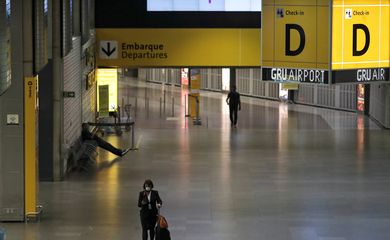Pandemic reduces passenger transport by 53% in 2020

Throughout 2020, regular flights carried 44.14 million passengers in Brazil and just over 282 thousand tons of cargo were handled between airports. However, passenger transport was the most affected by the covid-19 pandemic last year, with a reduction of 53%, while the drop in air cargo handling was 29.6%. In 2019, before the pandemic, 93.87 million passengers and more than 400 thousand tons of cargo were transported.

Social distancing measures were adopted across the country to combat the transmission of the new coronavirus, which impacted the circulation of people and products.
The information is contained in the study Territorial Networks and Flows: Air Connections 2019-2020, released today (10), in Rio de Janeiro, by the Brazilian Institute of Geography and Statistics (IBGE).
According to the survey, only 46 Brazilian cities had at least one regular passenger flight per month in 2020, compared to 96 cities in the previous year. The main air flow in the country - São Paulo-Rio de Janeiro - had a drop of 55.6% in the total number of tickets sold last year.
The biggest declines registered in tickets sold in 2020 were on the Uberlândia (MG)-São Paulo, with -69.6%, and São Paulo-Curitiba, with -60.9%. The smallest drops in the sale of tickets to the general public were São Paulo-Natal (-19%) and Fortaleza-Brasília (-24.1%).
São Paulo is the great national air hub (junction), either as a destination, origin or intermediate connection point for passengers and cargo. Last year, it handled more than 22 million passengers and more than 147 thousand tons of cargo.
Brasilia and the Northeast
“In turn, Brasília is another city that increases its position in the network by intensifying its passenger flows with the capitals of the Northeast Region, especially Natal, João Pessoa and Maceió. This reflects the increase in relationships that, on the one hand, reinforce the position of coastal cities as a tourist destination, but also reflect the intermediary role of the national capital as a complementary hub to São Paulo, increasing the list of possibilities of origins and destinations of these cities with the rest of the country” emphasizes the survey.
The cities of São Paulo, Manaus, Brasília and Campinas concentrated more than 85% of all air cargo handled in 2019.
According to the IBGE, another effect of the pandemic was the drop in air fares and, consequently, an improvement in economic accessibility measures in the main cities that still continued with regular air passenger service.
Destinations in the South and Southeast, such as São José dos Campos (SP), Joinville (SC) and Vitória (ES), have the cheapest weighted average fares and, therefore, greater economic accessibility.
Three cities in Rondônia have the most expensive weighted average fares in Brazil: Vilhena, Cacoal and Ji-Paraná.
The four cities with the lowest geographical accessibility in the country are from Amazonas: Lábrea, São Gabriel da Cachoeira, Carauari and Parintins.
According to the research, air transport of passengers and cargo in Brazil is a concentrated service, both in terms of volume and choice of destinations, in the upper stratum of the Brazilian urban hierarchy, that is, metropolises and regional capitals. The survey points to "a notorious concentration of the main flows and interactions in the Center-South portion of the country".
Text translated using artificial intelligence.



